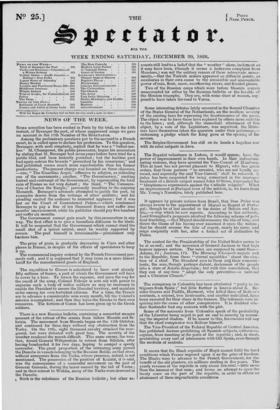There is a new Russian bulletin, containing a somewhat meagre
account of the retreat of the armies from before Shumla and Si- listria. The movement from Shumla began on the 15th October, and continued for three days without any obstruction from the Turks. On the 19th, eight thousand cavalry attacked the rear- guard, but were defeated with great loss. The severity of the weather rendered the march difficult. This same enemy, the wea- ther, forced General Wittgenstein to retreat from Silistria, after having bombarded it for two days, hoping to compel a speedy surrender. The great proportion cf the retreating army passed the Danube in vessels belonging to the Russian flotilla on that river, without annoyance front the Turks, whose presence, indeed, is not mentioned. The possession of the position of Kalatat, it is said, was the consequence of a successful movement on the part of General Geismar, during the terror caused by the fall of Varna ; and in their retreat to Widdin, many of the Turks were drowned in the Danube.
Such is the substance of the Russian bulletin ; but other ac- counts still lead to a belief that the " weather " alone, inclement as it may have been, (though it seems a ludicrous complaint from Russians,) was not the solitary reason of these retrograde move- ments,—that the Turkish armies appeared on different points, as auxiliaries in their own cause to the irresistible and unassailable power of rain, frost, snow, overflowing rivers, and flooded plains.
Two of the Russian corps which were before Shumla remain unaccounted for either by the Russian bulletin or the heralds of the Moslem triumphs. They are, with some show of reason, sup- posed to have taken the road to Varna.


















